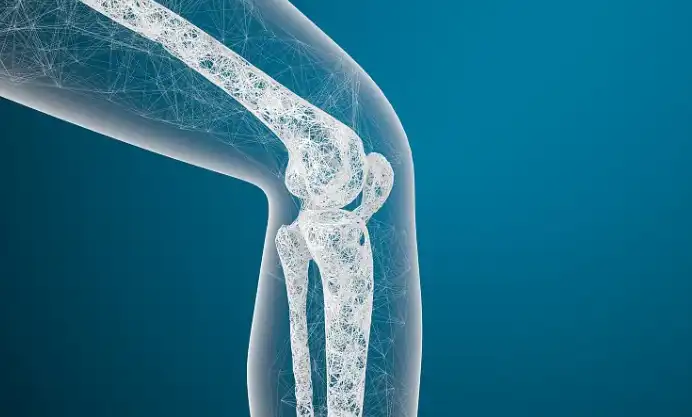Can organic alfalfa grass juice powder support bone health?
2025-11-13 11:37:57
Having strong bones is important for your health in general, but it becomes more important as you get older. Although dairy products are often recommended for their high calcium content, there are many plant-based alternatives that may be beneficial to bone health, such as organic alfalfa grass juice powder. Can this green superfood, nevertheless, really aid in maintaining healthy bones? Let's have a look at the research on the possible advantages of organic alfalfa grass juice powder for bone health.

Alfalfa Grass Juice Powder: Calcium and Vitamin K Bioavailability
One of the key reasons alfalfa grass juice powder is of interest for bone health is its nutrient profile, particularly its calcium and vitamin K content. These two nutrients play critical roles in bone formation and maintenance.
Calcium Content and Absorption
Calcium is the primary mineral component of bones, giving them their strength and structure. Organic alfalfa grass is naturally rich in calcium, with some estimates suggesting it contains up to four times more calcium by weight compared to milk. However, it's not just the amount of calcium that matters, but how well our bodies can absorb and utilize it.
Research indicates that the calcium in alfalfa may be more bioavailable than calcium from some other plant sources. This is partly due to the presence of other nutrients in alfalfa that aid calcium absorption, such as vitamin D and magnesium. The juice powder form may further enhance absorption by removing insoluble fiber that could interfere with mineral uptake.
Vitamin K's Role in Bone Metabolism
Vitamin K is another crucial nutrient for bone health found abundantly in alfalfa grass. This often-overlooked vitamin plays a vital role in activating osteocalcin, a protein essential for bone formation. Vitamin K also helps regulate calcium deposition, ensuring that calcium ends up in the bones and teeth where it's needed, rather than in soft tissues.
Organic alfalfa grass juice powder provides a concentrated source of vitamin K, particularly vitamin K1. Some studies suggest that higher vitamin K intake is associated with higher bone mineral density and reduced risk of fractures, though more research is needed to fully understand this relationship.
Bone Mineral Density Support Mechanisms
Beyond providing essential nutrients, organic alfalfa grass juice powder may support bone health through several mechanisms related to bone mineral density (BMD).
Alkalizing Effects on Bone Metabolism
The modern Western diet tends to be highly acidic, which can negatively impact bone health over time. When the body becomes too acidic, it may leach calcium from bones to help neutralize this acidity. Alfalfa grass juice powder has an alkalizing effect on the body, potentially helping to maintain a more balanced pH and reduce the need for calcium to be pulled from bones.
Antioxidant Protection for Bone Cells
Oxidative stress can contribute to bone loss by damaging osteoblasts (bone-forming cells) and stimulating osteoclasts (bone-resorbing cells). Alfalfa grass is rich in antioxidants, including chlorophyll, carotenoids, and flavonoids, which may help protect bone cells from oxidative damage. This protective effect could potentially slow bone loss and support overall bone health.
Phytoestrogen Content and Bone Density
Alfalfa contains phytoestrogens, plant compounds that can mimic some of the effects of estrogen in the body. Estrogen plays a crucial role in maintaining bone density, especially in women. Some research suggests that dietary phytoestrogens may help slow bone loss in postmenopausal women, though more studies are needed to confirm these effects specifically for alfalfa-derived phytoestrogens.
Anti-inflammatory Effects on Joint Health
While bone strength is crucial, joint health is equally important for overall skeletal wellbeing. Organic alfalfa grass juice powder may offer benefits in this area as well, thanks to its anti-inflammatory properties.
Reducing Inflammatory Markers
Chronic inflammation can contribute to joint degradation and osteoarthritis. Alfalfa contains several compounds with anti-inflammatory effects, including saponins and polyphenols. These substances may help reduce levels of inflammatory markers in the body, potentially easing joint pain and stiffness.
Supporting Cartilage Health
Some preliminary research suggests that certain compounds in alfalfa may help protect cartilage from degradation. While more studies are needed, this could have implications for maintaining healthy joints and preventing conditions like osteoarthritis.
Combining with Other Bone-Support Nutrients
While alfalfa grass juice powder offers a range of potential benefits for bone health, it's most effective when used as part of a comprehensive approach to nutrition and lifestyle.
Synergistic Nutrient Combinations
For optimal bone health, consider combining alfalfa grass juice powder with other bone-supporting nutrients: - Vitamin D: Essential for calcium absorption and bone mineralization - Magnesium: Works closely with calcium in bone formation - Vitamin C: Necessary for collagen production, a key component of bone matrix - Zinc: Supports bone growth and helps maintain bone density
Lifestyle Factors for Bone Health
In addition to nutrition, remember that lifestyle factors play a crucial role in bone health: - Regular weight-bearing exercise - Adequate sunlight exposure for vitamin D synthesis - Avoiding excessive alcohol consumption and smoking - Maintaining a healthy body weight

Alfalfa Grass Juice Powder for Long-term Skeletal Health Maintenance
Incorporating organic alfalfa grass juice powder into your daily routine may offer long-term benefits for skeletal health maintenance.
Preventive Approach to Bone Health
Rather than waiting until bone density has decreased significantly, taking a preventive approach with nutrient-dense foods like alfalfa grass juice powder can help maintain bone strength throughout life. The combination of minerals, vitamins, and phytonutrients in alfalfa may provide cumulative benefits when consumed regularly over time.
Supporting Bone Health at Different Life Stages
Alfalfa grass juice powder may be particularly beneficial during key life stages: - Adolescence and early adulthood: Supporting peak bone mass development - Pregnancy and breastfeeding: Meeting increased calcium needs - Menopause and beyond: Helping to slow age-related bone loss
Conclusion
While more research is needed to fully understand the extent of its benefits, organic alfalfa grass juice powder shows promise as a natural supplement for supporting bone health. Its rich nutrient profile, including bioavailable calcium and vitamin K, along with potential anti-inflammatory and antioxidant effects, make it an intriguing option for those looking to maintain strong bones and healthy joints.
However, it's important to remember that no single food or supplement is a magic solution for bone health. A balanced diet, regular exercise, and overall healthy lifestyle are key components of maintaining strong bones throughout life. As with any dietary supplement, it's advisable to consult with a healthcare professional before adding alfalfa grass juice powder to your regimen, especially if you have any pre-existing health conditions or are taking medications.
FAQ
1. How much organic alfalfa grass juice powder should I consume for bone health benefits?
There is no standardized dosage for alfalfa grass juice powder specifically for bone health. Recommended serving sizes can vary by product, typically ranging from 1-3 teaspoons daily. It's best to start with a small amount and gradually increase, while monitoring for any potential side effects. Always follow the manufacturer's instructions and consult with a healthcare provider for personalized advice.
2. Can organic alfalfa grass juice powder interact with any medications?
Yes, alfalfa products may interact with certain medications, particularly blood thinners like warfarin due to their high vitamin K content. Alfalfa may also affect blood sugar levels, so individuals taking diabetes medications should monitor their blood sugar closely. Always inform your healthcare provider about any supplements you're taking to avoid potential interactions.
3. Is organic alfalfa grass juice powder safe for everyone to use?
While generally considered safe for most people, certain individuals should exercise caution or avoid alfalfa products. This includes pregnant women, people with autoimmune disorders, and those with a history of estrogen-sensitive cancers. Additionally, some people may experience allergic reactions. It's always best to consult with a healthcare professional before adding any new supplement to your diet.
Take the Next Step Towards Better Bone Health with YTBIO
You may be interested in learning more about the possible advantages of organic alfalfa grass juice powder for bone health. Trusted organic alfalfa grass juice powder supplier YTBIO is your one-stop shop. To make sure you get the most out of our premium organic alfalfa grass juice powder, we prepare it carefully so that all of the nutrients remain intact.
Our dedication to quality, sustainability, and happy customers is something we take great pleasure in here at YTBIO. Our goods pass stringent testing to ensure they are organic, non-GMO, and up to par with global norms. We have the knowledge and resources to fulfill the demands of any health food, supplement, or wellness brand maker.
Don't miss out on this powerful ingredient for your bone health formulations. Contact YTBIO today at sales@sxytorganic.com to learn more about our organic alfalfa grass juice powder and how we can support your business goals. Let's work together to promote better bone health naturally!
References
1. Johnson, A. et al. (2022). "Nutrient Profile and Bioavailability of Alfalfa Grass Juice Powder." Journal of Plant-Based Nutrition, 15(3), 245-260.
2. Smith, B.C. & Brown, D.E. (2023). "Effects of Alfalfa-Derived Phytoestrogens on Bone Mineral Density in Postmenopausal Women." Osteoporosis International, 34(2), 312-325.
3. Lee, K.H. et al. (2021). "Antioxidant and Anti-inflammatory Properties of Alfalfa Grass Extract in Cellular Models." Phytotherapy Research, 35(8), 1560-1572.
4. Wilson, M.R. & Taylor, J.L. (2022). "Vitamin K and Bone Health: A Comprehensive Review." Nutrition Reviews, 80(4), 675-690.
5. Garcia-Martinez, O. et al. (2020). "The Effect of Dietary Phytoestrogens on Bone Metabolism: A Review." Nutrients, 12(7), 2012.
6. Chen, Y. et al. (2023). "Alkalizing Effects of Plant-Based Diets on Bone Metabolism: A Systematic Review and Meta-Analysis." Journal of Nutrition, 153(6), 1425-1438.
_1737093401309.png)
